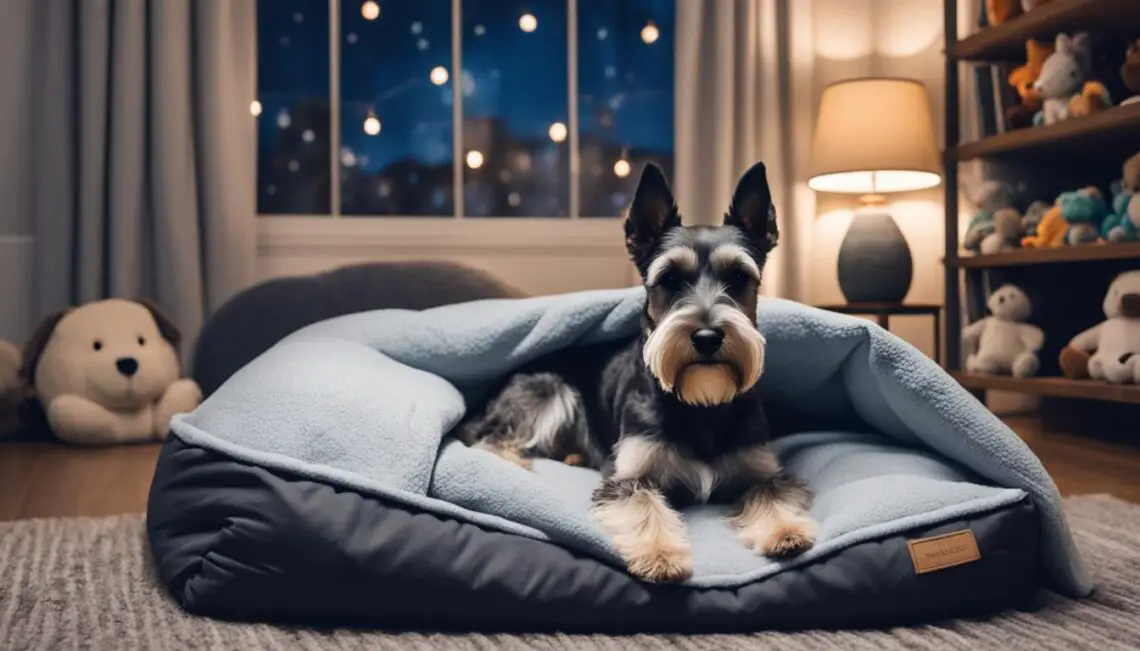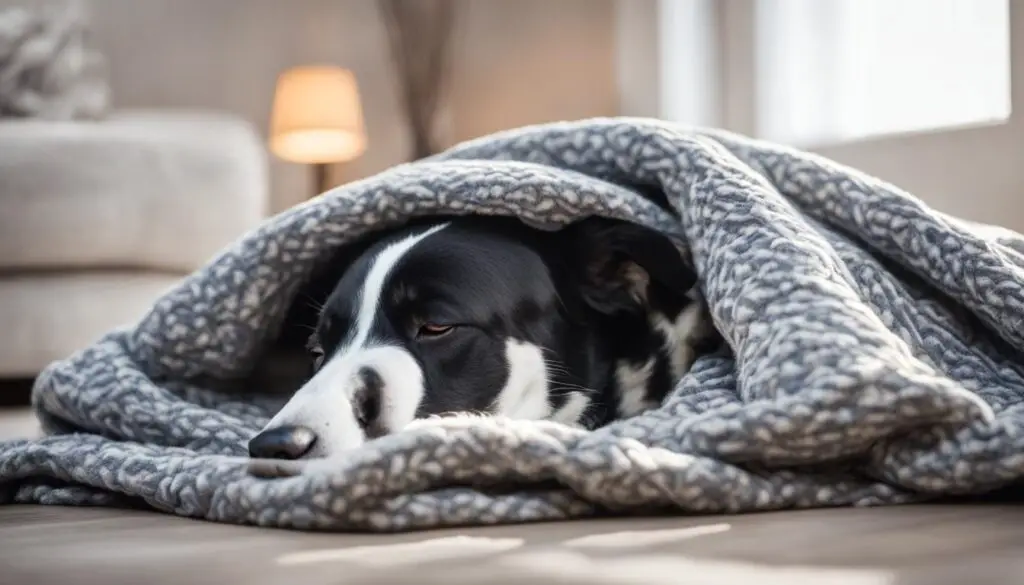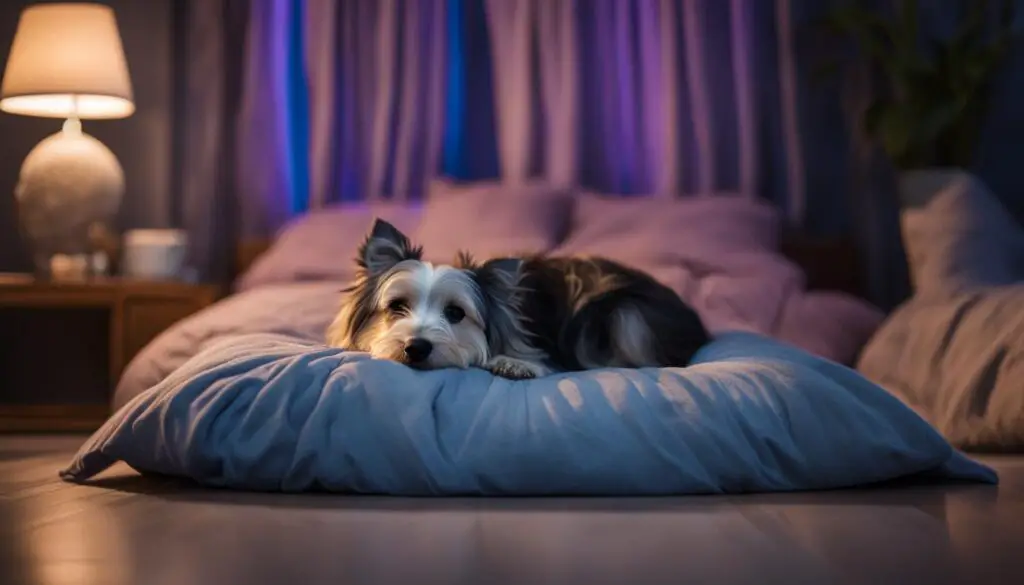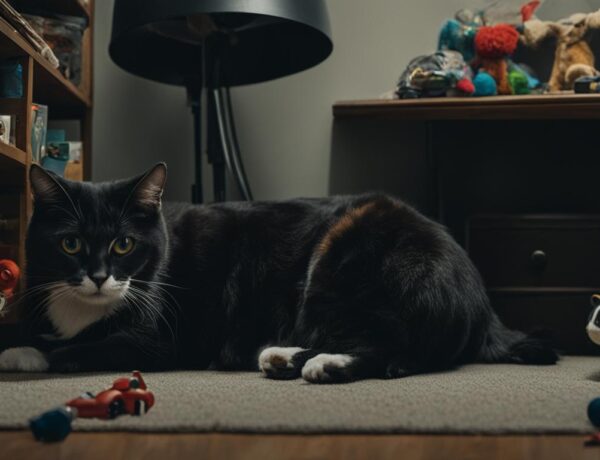As a dog owner, I have always been fascinated by the unique sleep patterns of different breeds. Today, I want to delve into the sleep patterns of small dogs and explore how we can provide them with better care, ensuring they get the rest they need for optimal health and happiness.
Small dogs, like their larger counterparts, have specific sleep needs that are crucial to their well-being. By understanding these patterns, we can create an environment that promotes healthy sleep and supports their overall quality of life.
Key Takeaways:
- Small dogs have unique sleep patterns that require our understanding and attention.
- Providing a cozy and secluded sleeping area for puppies and young adult dogs is essential.
- Senior dogs may have increased sleep requirements and should be monitored for changes in sleep patterns.
- Factors such as breed, age, health, and lifestyle can influence a dog’s sleep needs.
- Being aware of sleep disorders in dogs and seeking veterinary care when necessary is important.
Sleep Patterns of Puppies
Puppies have unique sleep patterns that are essential for their development and overall well-being. As pet owners, it’s crucial to understand and accommodate their specific sleep needs to ensure they grow into healthy and happy adult dogs.
On average, puppies require about 18 to 20 hours of sleep per day. This includes eight hours during the night and several short naps throughout the day. Their sleep patterns are different from adult dogs because they are still growing and going through various developmental stages.
Establishing a regular nap schedule for your puppy is crucial. It helps them get the rest they need to support their physical and mental development. Designate a cozy and secluded area where your puppy can sleep undisturbed. This could be a crate or a comfortable bed in a quiet part of your home.
“Puppies need plenty of sleep to recharge and grow. Ensuring they have a designated sleep space and regular nap schedule is crucial for their overall well-being.”
Puppies have a lot of energy and can quickly become overstimulated. A structured nap schedule helps prevent overtiredness and promotes calm behavior. It’s important to provide a safe and comfortable environment free from distractions to encourage uninterrupted sleep.
The Benefits of Proper Sleep for Puppies
Proper sleep is vital for a puppy’s physical and mental development. During sleep, puppies experience REM (rapid eye movement) sleep, which is essential for learning and processing information. Here are key benefits of providing puppies with sufficient sleep:
- Healthy growth and development: Adequate sleep supports proper growth and development of the puppy’s body and brain.
- Improved learning ability: Sufficient sleep enhances a puppy’s ability to learn new commands and behaviors.
- Enhanced immune system: Sleep helps strengthen a puppy’s immune system, promoting overall health and well-being.
- Positive behavior: Proper rest contributes to better behavior and a calmer disposition in puppies.
| Sleep Patterns of Puppies | Hours of Sleep |
|---|---|
| Overnight sleep | 8 hours |
| Naptime | Several short naps throughout the day |
| Total sleep per day | 18 to 20 hours |
Sleep Patterns of Young Adult Dogs
Young adult dogs, like their puppy counterparts, have specific sleep patterns that are important to understand in order to provide them with adequate rest. On average, young adult dogs need about eight to 14 hours of sleep per day. However, the exact amount may vary depending on factors such as breed and energy level.
Young adult dogs tend to have longer periods of sleep at night, similar to adult humans. This consolidated sleep during the night helps them recharge and restore their energy levels. However, it’s essential to note that young adult dogs still require daytime naps to maintain their overall well-being.
Creating a quiet and comfortable sleeping space for young adult dogs is crucial. This designated sleeping area should be free from distractions and noise, allowing them to fully relax and recharge during their rest periods. Providing a cozy bed or blanket along with a secluded space can help them feel safe and secure.
It’s important to establish a consistent routine for young adult dogs, ensuring they have ample opportunities for restorative sleep. By encouraging a balanced schedule that includes both nighttime sleep and daytime naps, owners can help their young adult dogs maintain optimal physical and mental health.
Benefits of Sufficient Sleep for Young Adult Dogs
“Adequate sleep is crucial for young adult dogs as it plays a pivotal role in their overall well-being and development.” – Dr. Emily Smith, Veterinary Specialist
Allowing young adult dogs to fulfill their sleep needs offers a range of benefits. Adequate sleep promotes physical growth, mental clarity, and emotional stability. It aids in memory consolidation, learning, and problem-solving abilities. Furthermore, sufficient rest improves immune function and helps prevent health issues related to chronic sleep deprivation.
Incorporating regular exercise into their daily routine can also contribute to better sleep for young adult dogs. Engaging in physical activities helps them expend energy, making it easier for them to relax and fall asleep. However, it’s important to ensure that exercise is completed during appropriate times before sleep to avoid overstimulation.
Common Sleep Disturbances in Young Adult Dogs
While young adult dogs typically have healthy sleep patterns, certain factors can disrupt their rest. Anxiety, noise disturbances, temperature changes, or an uncomfortable sleeping environment can all impact their sleep quality. Addressing these factors and creating a soothing sleep environment can help alleviate sleep disturbances and promote better sleep for young adult dogs.
Sleep Patterns of Senior Dogs
Senior dogs have unique sleep patterns that differ from those of younger dogs. As dogs age, their bodies and brains require additional sleep to recover from exertion and maintain overall well-being. Just like puppies, senior dogs tend to sleep more to meet their increased rest requirements, which can range from 14 to 18 hours per day.
If you notice a sudden increase in the amount of time your senior dog sleeps or a change in their behavior, it’s important to consult with a veterinarian. These changes could be indicative of underlying medical conditions that might require attention and treatment. Therefore, it’s essential to rule out any potential health issues to ensure your senior dog’s comfort and quality of life.
In most cases, however, allowing your sleeping dog to lie undisturbed is the best approach. Interrupting their sleep unnecessarily can be detrimental to their overall well-being and disrupt their sleep patterns. Senior dogs need uninterrupted rest to rejuvenate their bodies, relax their minds, and promote optimal cognitive functioning.
“Sleep is a crucial aspect of a senior dog’s overall health and well-being. Providing a comfortable environment and ensuring uninterrupted sleep can contribute to their longevity and happiness.”
Tips for Promoting Quality Sleep for Senior Dogs:
- Create a cozy sleeping area: Provide a comfortable bed or cushion that offers support and helps alleviate any joint pain or discomfort associated with aging.
- Choose a quiet and peaceful location: Ensure that the sleeping area is in a quiet part of your home, away from excessive noise or disturbances.
- Maintain a consistent sleep schedule: Establishing a routine helps senior dogs anticipate and prepare for rest, promoting better sleep quality.
- Consider cognitive enrichment activities: Engage your senior dog in mentally stimulating exercises during awake hours to help reduce anxiety and encourage relaxation during sleep.
To better understand the sleep patterns of senior dogs, let’s take a look at a comparison of the sleep needs of different age groups:
| Age Group | Recommended Sleep Duration |
|---|---|
| Puppies | 18-20 hours per day |
| Young Adult Dogs | 8-14 hours per day |
| Senior Dogs | 14-18 hours per day |
Factors Affecting Dogs’ Sleep Patterns
When it comes to dogs’ sleep patterns, several factors can play a significant role. Understanding these factors is key to providing your furry friend with the rest they need for optimal health and well-being.
Age
Age is a crucial factor that can influence a dog’s sleep patterns. Puppies, for example, require more sleep compared to adult dogs. Their growing bodies and active minds need plenty of rest to recharge. On the other hand, senior dogs may sleep more due to age-related changes and decreased energy levels.
Breed
Another factor to consider is the breed of your dog. Different breeds might have varying sleep needs. For instance, larger breeds often require more sleep than smaller breeds. Additionally, some breeds are known to be more active or have higher energy levels, which can impact their sleep patterns.
Health
A dog’s overall health and any underlying medical conditions can also affect their sleep patterns. Just like humans, dogs may experience discomfort or pain that can disrupt their sleep. It’s important to monitor your dog’s health and seek veterinary care if you notice any changes in their sleep behavior.
Lifestyle
The lifestyle and daily activities of your dog can also play a role in their sleep patterns. Working dogs, such as police or military canines, have different sleep needs due to their demanding tasks. Similarly, dogs with an active lifestyle or those participating in sports may require more rest to recover and recharge.
Understanding the factors that can affect your dog’s sleep patterns is crucial for providing them with the right amount of rest. By considering their age, breed, health, and lifestyle, you can create a sleep routine that caters to their individual needs and ensures they get the sleep they require.
| Factors | Influence on Sleep Patterns |
|---|---|
| Age | Determines the amount of sleep needed, with puppies and senior dogs requiring more rest. |
| Breed | Varies sleep requirements due to differences in size, energy levels, and tendencies. |
| Health | Underlying medical conditions may disrupt sleep patterns and overall sleep quality. |
| Lifestyle | Different activities and tasks may influence the amount and quality of sleep needed. |
By considering these factors and making necessary adjustments, you can help your furry companion establish healthy and consistent sleep patterns, providing them with the rest they need to thrive.
Sleep Disorders in Dogs
Dogs, like humans, can experience sleep disorders that can impact their overall well-being. It’s essential for dog owners to be aware of these sleep disorders and their symptoms to ensure their furry friends receive the necessary care and treatment. Here, I will discuss three common sleep disorders in dogs: narcolepsy, obstructive sleep apnea, and REM sleep behavior disorder.
Narcolepsy
One sleep disorder that dogs may experience is narcolepsy. This neurological disorder causes sudden episodes of excessive sleepiness and sudden muscle weakness. Dogs with narcolepsy may fall asleep suddenly, even during activities such as playing or eating. While it’s a relatively rare condition in dogs, it’s important for owners to recognize the symptoms and consult with a veterinarian for proper diagnosis and management.
Obstructive Sleep Apnea
Obstructive sleep apnea is another sleep disorder that can affect dogs. Similar to humans, dogs with this condition experience interruptions in their breathing during sleep. It is often caused by a narrowed or blocked airway, leading to difficulty in inhaling oxygen. Symptoms of obstructive sleep apnea in dogs include loud snoring, gasping for air, and pauses in breathing during sleep. If you notice these symptoms in your dog, it’s crucial to seek veterinary care for proper evaluation and treatment.
REM Sleep Behavior Disorder
REM sleep behavior disorder is characterized by abnormal movements and behaviors during the rapid eye movement (REM) phase of sleep. Dogs with this disorder may act out their dreams, which can lead to unintentional physical harm or injury. They may growl, bark, run, or even bite while asleep. If your dog displays these behaviors during sleep, it’s important to consult with a veterinarian to rule out any underlying health issues and discuss potential treatment options.
In conclusion, sleep disorders can affect dogs just like they do humans. Recognizing the symptoms and seeking appropriate veterinary care is crucial for ensuring the well-being and quality of sleep for our furry companions. By staying informed and proactive, we can help our dogs get the restful sleep they need for a happy and healthy life.
Tips for Improving Dogs’ Sleep Quality
Improving the sleep quality of dogs is essential for their overall well-being and health. By following these practical tips, you can create an environment that promotes restful sleep and ensures your furry friend wakes up refreshed and revitalized.
Establish a Consistent Sleep Schedule
Just like humans, dogs benefit from having a consistent sleep routine. Set a regular bedtime and wake-up time that aligns with their natural sleep patterns. This helps regulate their internal clock and promotes better sleep quality.
Create a Comfortable Sleeping Area
Provide your dog with a comfortable and cozy sleeping area that meets their preferences. Consider their size, breed, and individual needs when choosing a bed or bedding material. A well-padded bed or blanket can provide the necessary support and comfort for a good night’s sleep.
Ensure a Quiet and Dark Environment
Dogs are sensitive to their surroundings, and a quiet and dark sleep environment can significantly improve their sleep quality. Minimize noise and distractions in the sleeping area, and use blackout curtains or blinds to block out excess light.
Incorporate Regular Exercise
Regular exercise plays a vital role in helping dogs burn off excess energy and sleep better at night. Engage your dog in physical activities that suit their needs and abilities, such as walks, playtime, or interactive toys. Aim for at least 30 minutes to 1 hour of exercise each day.
Have a Routine for Puppies
Puppies thrive on routine, and having a structured schedule can help them feel secure and relaxed. Establish a predictable routine that includes regular nap times and periods of rest throughout the day. This can contribute to better sleep quality and overall well-being.
Allow for Periods of Relaxation
Just like humans, dogs need downtime to unwind and relax. Create opportunities for your dog to have quiet moments of relaxation throughout the day. This can include designated rest areas or quiet corners where they can retreat and recharge.
By implementing these tips, you can improve your dog’s sleep quality and contribute to their overall health and happiness. Remember, a well-rested dog is a happy dog!
Conclusion
Understanding the sleeping patterns of small dogs is crucial for providing them with better care and ensuring their overall well-being. Small dogs, just like their larger counterparts, have specific sleep requirements that need to be met for optimal health. By acknowledging and respecting these needs, owners can create a nurturing environment that promotes healthy sleep habits, leading to a happier and healthier small dog.
By implementing the tips outlined in this article, such as establishing a consistent sleep schedule, providing a comfortable sleeping area, ensuring a quiet and dark environment, incorporating regular exercise, and considering the specific needs of each dog, owners can greatly improve the quality of sleep their small dogs receive.
Small dogs have unique sleep patterns that should be considered when providing care. Puppies require longer periods of sleep, while young adult dogs and senior dogs have their own individual sleep needs. By adapting a sleep routine that suits the age and breed of the small dog, owners can contribute to a more restful and rejuvenating sleep experience.
In conclusion, understanding and prioritizing the sleeping patterns of small dogs is an essential aspect of responsible pet ownership. By taking the time to comprehend the specific sleep needs of small dogs and making adjustments accordingly, owners can ensure their beloved pets receive the rest and care they require. Providing a conducive sleep environment will not only promote better sleep but also contribute to the overall health, happiness, and longevity of small dogs.
FAQ
How much sleep do puppies need?
Puppies need about 18 to 20 hours of sleep per day, including eight hours at night and several short naps throughout the day.
How much sleep do young adult dogs need?
Young adult dogs need about eight to 14 hours of sleep per day, although the amount may vary depending on breed and energy level. They still require daytime naps to recharge.
How much sleep do senior dogs need?
Senior dogs tend to sleep more, similar to puppies. Their bodies and brains need additional sleep to recover from exertion. If there are sudden changes in sleep patterns or behavior, consult a veterinarian.
What factors can influence a dog’s sleep patterns?
Several factors including age, breed, health, and lifestyle can influence a dog’s sleep patterns. Puppies and larger breeds typically need more sleep, while working dogs may have different sleep needs.
Can dogs experience sleep disorders?
Yes, dogs can experience sleep disorders such as narcolepsy, obstructive sleep apnea, and REM sleep behavior disorder. If there are symptoms, seek veterinary care.
How can I improve my dog’s sleep quality?
To improve your dog’s sleep quality, establish a consistent sleep schedule, provide a comfortable sleeping area, ensure a quiet and dark environment, incorporate regular exercise, and create a routine for puppies with relaxation periods.







No Comments